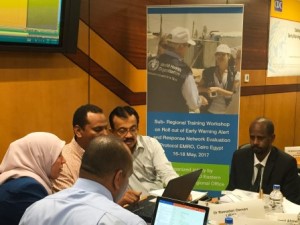 13 June 2017 - WHO conducted a training workshop on the use of evaluation protocols for the Early Warning and Response Network (EWARN) – a proactive disease surveillance system used to rapidly detect and react to suspected disease outbreaks in countries affected by humanitarian emergencies. The workshop was conducted in Cairo at WHO’s Regional office of the Eastern Mediterranean from 16 to 18 May 2017 by WHO global EWARN experts in collaboration with Centers for Disease Control and Prevention (CDC).
13 June 2017 - WHO conducted a training workshop on the use of evaluation protocols for the Early Warning and Response Network (EWARN) – a proactive disease surveillance system used to rapidly detect and react to suspected disease outbreaks in countries affected by humanitarian emergencies. The workshop was conducted in Cairo at WHO’s Regional office of the Eastern Mediterranean from 16 to 18 May 2017 by WHO global EWARN experts in collaboration with Centers for Disease Control and Prevention (CDC).
The aim of the training was to ensure that critical health professionals managing EWARN systems are equipped with the relevant skills and tools to be able to implement and contribute to standardized EWARN evaluations in their respective countries. Participants included EWARN focal points from 11 countries which are presently experiencing humanitarian crises of varying severity, namely Afghanistan, Iraq, Jordan, Lebanon, Libya, Pakistan, Palestine, Syria, Sudan, Somalia, and Yemen.
WHO’s Eastern Mediterranean region is unique in experiencing a high volume of humanitarian crises across its Member nations, where large sections of the national population have been displaced due to political, security and environmental factors. This has resulted in overcrowded camps and temporary settlements, inadequate food and shelter, destroyed infrastructure, unsafe water, poor sanitation and lack of access to health care which have compounded their difficulties, and have created the ideal environment for disease outbreaks. Under such circumstances, it is essential for countries to have effective EWARN systems for timely detection and response to outbreaks.
EWARN has been implemented in 9 member states that have been affected by humanitarian crisis including Syria, Iraq, Yemen, Libya, Lebanon, Afghanistan, Pakistan, Somalia, and Sudan. To ensure that these systems are achieving their objectives and operating optimally, it is important to regularly check their integrity and quality of performance.
Although WHO and partners regularly evaluate EWARN systems, methods used were not common across nations. The new evaluation protocol will allow countries to use a standardized approach that can enable a fair comparison of experiences and share lessons learned for enhancing timely detection and management of outbreaks in a crisis-affected country.
Related links
WHO conducts first EWARS assessment in Syria
3 April 2017




